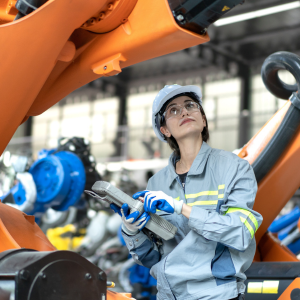2019 Manufacturing Trends
Post By: Ryan King On: 24-10-2018 - Industry Trends
2019 is approaching fast! 2018 has seen many more manufacturers adopt new technologies, techniques and concepts to increase production and reduce costs. 2019 is only going to accelerate this adoption.
Manufacturers have always faced challenges with the rapid developments of in technology. Devices and software quickly get updated and replaced, usually between 6-12 months. Failing to invest and keep up with the latest technological developments can leave businesses struggling to compete with their competitors as they invest in the technologies.
Businesses that get ahead of their competition can increase their production, profits and customer base, outperforming their competition.
Manufacturers have seen many significant technological advances in the past few decades including; the internet, robotics, automation, AI and more. In the next year, businesses will see more developments ready to change the industry.
1. IoT
The manufacturing industry has been investing in IoT (the internet of things) for many years. According to the IDC, "the manufacturing industry was good for a total IoT spend of $178 billion in 2016." This is twice the size of the second largest market in IoT spend, transportation.
Manufacturing is one of the biggest markets for industrial IT projects implementation. IoT is expected to increase significantly during 2019 with businesses adopting more connected machines and devices connected to central networks and the internet.
IoT is fundamentally a network of devices and software which can access a central system or the internet. IoT allows for a more accessible and data-rich process. For some businesses, investing in the internet of things may not be such a big deal due to output volumes. However, IoT is set to shape the manufacturing industry in 2019 as many manufacturers adopt the technology to increase production and reduce their overheads.
Manufacturers will use IoT for facility management, production flow monitoring, inventory management and many more processes within their businesses.
Investing in IoT now will give manufacturers and businesses the chance to get ahead of their competition and cement a secure future for the company going forward.
2. Cyber Security as a Priority
With the internet of things growing in the manufacturing industry, we will see a shift in businesses' priorities, as they look at cybersecurity becoming a more critical factor in day to day operations.
It is vital that manufacturers that adopt connected technologies increase their awareness and preventative measures against cyber attacks. Connected technologies will become one of the most critical assets for manufacturers, and they will want to secure their networks and systems to prevent loss of revenue.
3. Augmented Reality
You've probably haven't heard of augmented reality before, but you most likely have seen it working. If you have applied a Snapchat filter or played Pokemon Go!, you have used augmented reality. Augmented reality is the process of overlaying digital graphics and images on to real-life object through the view of your device's camera. But, how does it help manufacturers in 2019?
One of the biggest reasons augmented reality is being utilised by manufacturers is through the prototyping, testing, training and even repair stages.
Prototyping
Manufacturers will use augmented reality in 2019 to place digital renderings of products in real life situations and test visual design and size, without manufacturing an expensive prototype.
Testing
Testing is set to become a big part of the augmented reality development. It will allow workers to overlay test data from sensors and machines to quickly view information where it is needed.
Repairs
When a machine fails, it can be challenging to identify the root cause of the problem. By using workers devices, they can obtain instruction manuals, technical information and sensor information on the machine to help diagnose the problem and find a solution quickly.
Training
Manufacturing jobs can be dangerous if you don't know what you are doing. Augmented reality will play a significant role in company training programs by showing detailed parts information and models on screen without having to touch the machine. This allows workers to learn everything they need to know before stepping out on to the factory floor. Think of it as you own manufacturing simulator.
4. Blockchain
In 2017/18 you most likely heard of the cryptocurrency boom, most notably the increase in value for BitCoin. The technology behind cryptocurrencies is known as blockchain. The blockchain is a technology that distributes information among thousands of computers reduce the threats of hackers gaining access to one central system. This is known as decentralised networks. It is like storing your money with 1000 banks instead of one, significantly reducing the chances of you losing all your money.
Blockchain technology will have its most direct impact on the financial operations of manufacturers. Blockchain will allow businesses to quickly, securely, cost-effectively send and receive payments to and from suppliers, other companies and customers. By using a payment provider which leverages blockchain already, manufacturers do not need to worry about implementing the technologies themselves.
There are other ways the manufacturing industry is using blockchain technology, and we are likely to see this grow significantly in 2019. Supply chain management, product tracking, transaction reporting and certification registration is set to be the big movers in 2019 with many startups popping up dedicated to developing systems to manage blockchain technologies.
5. Collaboration
Collaborative technologies, tools and systems have been used in many other industries for many years like software development. However, in 2019 more manufacturing companies will adopt collaborative systems as well as hardware to close the gap between employees and machines.
Many manufacturers of manufacturing equipment have been developing robots, machine interfaces and PLCs which work collaboratively with employees to speed up production, reduce costs and improve quality in their output.
Robotic technology is poised to transform the manufacturing industry. With its integrations with IoT, blockchain and collaborative technologies, we will see the smart factory advance significantly.
Conclusion
2019 is looking to be a great year for manufacturing. As more technologies, systems and processes are introduced to businesses over the next few years, we will see massive shifts in how products are manufactured, while seeing manufacturers growing their revenues, profits and customer satisfaction.
Get More From Rowse Straight To Your Inbox




